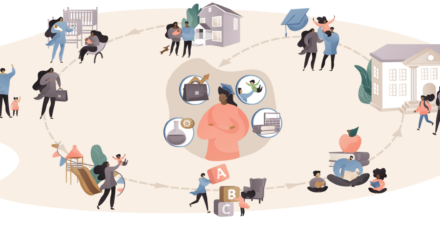A growing body of evidence shows that investments in high-quality, affordable, and accessible childcare and learning are a key element of a healthy, growing U.S. economy. Research tells us that the ages zero to three are a critically important time for developing the wide range of skills necessary for future success. Equitable Growth is growing the evidence base for the demand side of the early education equation—what do families need and want for their children and themselves and what are the obstacles to access across the economic distribution—and the supply side of the equation—what does quality childcare look like, and how do we expand access to quality early care and learning jobs in a way that creates meaningful economic security for care workers?
Featured work
Child care prices, inflation, and the end of federal pandemic-era aid in five charts
May 8, 2023
May 8, 2023
What is social infrastructure, and how does it support economic growth in the United States?
January 26, 2023
January 26, 2023
Factsheet: What the research says about the economics of the 2021 enhanced Child Tax Credit
November 29, 2022
November 29, 2022
Advancing research and evidence on child care and U.S. economic growth
November 10, 2022
November 10, 2022
Factsheet: What the research says about the economics of early care and education
September 15, 2021
September 15, 2021
Explore Content in Childcare & Early Education211
Factsheet: What we know about the federal employer-provided child care credit and how can it be better used by businesses
April 22, 2025
April 22, 2025
Request for Proposals: The economic effects of the Inflation Reduction Act
April 2, 2025
April 2, 2025
ASSA 2025 Round-up: Day 3
January 6, 2025
January 6, 2025
Request for Proposals: Promoting competition and supporting workers in an era of AI innovation
November 20, 2024
November 20, 2024
Request for proposals: Research grants for early career scholars
October 30, 2024
October 30, 2024
Big Daycare: The Impact of Private Equity-Owned Child Care Businesses on the Market for Early Care and Education
August 27, 2024
August 27, 2024
Evaluating the Impact of the 2021 CDCTC Expansion on Women’s Labor Supply and Childcare Utilization
August 27, 2024
August 27, 2024
Equitable Growth receives funding to advance women’s power, gender equality, and care economy
May 28, 2024
May 28, 2024
Request for Proposals: How effective was the fiscal response to the COVID-19 recession for workers?
March 18, 2024
March 18, 2024
Request for proposals: Research grants for early career scholars
November 30, 2023
November 30, 2023
Explore the Equitable Growth network of experts around the country and get answers to today's most pressing questions!

















